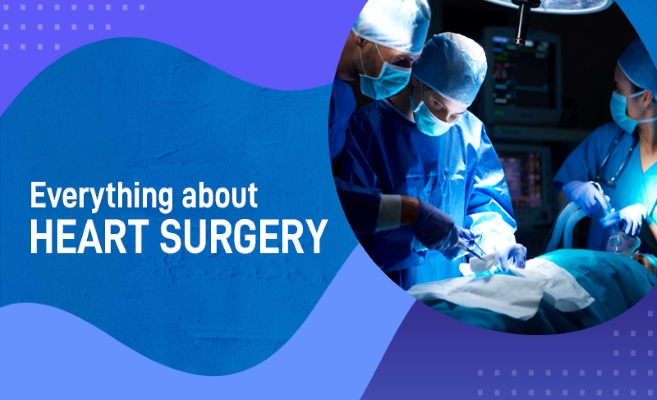Everything About Heart Surgery

Cardiac surgery, or cardiovascular surgery, is surgery on the heart or great vessels performed by cardiac surgeons. It is used to treat complications of ischemic heart disease (for example, with coronary artery bypass grafting); or to treat valvular heart disease from various causes, including endocarditis, rheumatic heart disease, and atherosclerosis. It also includes heart transplantation and other diseases of great vessels.
Types of Heart Surgery
- Aortic Surgery : Surgery to repair or replace aortic aneurysms and aortic dissections.
- Heart Valve Surgery : Surgery to repair or replace a valve that is not working correctly.
- Congenital Heart Surgery : Corrective surgery to fix or treat a genetic heart defect.
- Coronary Artery Bypass graft (CABG) surgery : A surgical procedure used in which the blocked portion of the coronary artery is bypassed with another piece of blood vessel.
- Heart Transplant : A surgical option to treat advanced heart failure, a condition that occurs when the heart can’t pump enough oxygenated blood to meet the needs of the body’s organs.
- Left ventricular assist device (LVAD) : A mechanical device which aids in the pumping function of the Heart.
- Myectomy/myotomy : A surgical treatment option that removes a portion of the enlarged heart wall.
Types of open-heart surgery:
- On-pump: A heart-lung bypass machine connects to the heart and temporarily takes over for the heart and lungs. It circulates blood through the body while moving blood away from the heart. The surgeon then operates on a heart that isn’t beating and doesn’t have blood flow. After surgery, the surgeon disconnects the device and the heart starts to work again.
- Off-pump: Off-pump bypass surgery takes place on a heart that continues to beat on its own. This approach works for coronary artery bypass grafting (CABG) surgery (bypass surgery). It is also called as beating-heart surgery.
Preparation for Heart surgery?
- Medications: You may need to stop taking certain medicines a week or two before surgery. People often stop blood thinners (aspirin, warfarin or other medicines that prevent blood clots and strokes) and nonsteroidal anti-inflammatory drugs (NSAIDs). These medicines can increase bleeding risk.
- Food and drink: Your healthcare team will ask you to fast overnight (not eat or drink) before your surgery. Anesthesia is safer on an empty stomach.
- Smoking and alcohol: Cut back on alcohol and quit smoking. Both can slow postsurgical healing and increase the risk of complications.
After open-heart surgery:
Depending on the procedure, you may stay in the hospital intensive care unit (ICU) for a day or longer. When you’re ready, you will move to a regular hospital room.
You can expect to stay several days in the hospital. Your heart care team will explain how to care for your incision. You may have a special firm pillow to protect your chest when you cough, sneeze or get out of bed.
Potential risks or complications of Heart Surgery:
Open-heart surgery is a major surgical procedure. Like all surgeries, there are risks.
The risk of complications is greater if you have health problems like diabetes or obesity. Lung conditions like chronic obstructive pulmonary disease (COPD) also raise your risk. People who smoke are more prone to surgical and postsurgical issues.
Recovery after Heart Surgery?
Recovery time varies depending on the surgery type, complications and your overall health before surgery. It can take 2-4 weeks (and sometimes longer) to recover from an open-heart procedure.
Your surgeon will let you know when you can return to work and other activities. Typically, you shouldn’t drive or lift anything heavy for the first four weeks.
Some people need to take blood thinners after heart surgery to prevent blood clots. Your healthcare provider may also recommend cardiac rehabilitation. This medically supervised program can help you regain strength and stamina and improve overall heart health.
The Cardiac Surgery Department at PSRI specializes in all kinds of cardiac surgery and is renowned for dealing with complex heart problems. We have with us renowned cardiac specialists who are amongst India’s best. Innovative techniques and multiple specialists give patients the advantage of superior therapies and preventive care for disorders of the heart and vascular system.
The expertise of our cardiac surgeons extends to surgery for heart failure, Aneurysms & Pulmonary Embolisms, Coronary Artery Bypass Grafting and Valve Surgeries. PSRI has carved a niche in addressing Complex heart surgeries too. The success rate in cardiac surgeries is among the highest in India and comparable with the best healthcare institutions anywhere in the world.

 Book An Appointment
Book An Appointment Virtual Consultation
Virtual Consultation





